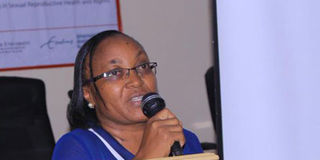Netherlands commits Shs15.8b towards reproductive health in Uganda

Dr Elizabeth Nabiwemba. COURTESY PHOTO
Makerere University School of Public Health in partnership with the Netherlands embassy have launched a sexual and reproductive health rights centre to be used in research and training participants from different sectors and regions as a move to enhance accessibility and quality of services.
According to the World Health Organisation (WHO), Sexual and reproductive health and rights encompass efforts to eliminate preventable maternal and neonatal mortality and morbidity, to ensure quality sexual and reproductive health services, including contraceptive services, and to address sexually transmitted infections (STI) and cervical cancer, violence against women and girls, and sexual and reproductive health needs of adolescents.
Dr Elizabeth Nabiwemba, the project director said the structure, located at Kasangati Health Centre IV in Wakiso District is part of the €3.8m ( about Shs15.8b) five year project funded by the Netherlands embassy that is ending next year.
"This project is meant to improve the quality of SRH services in Uganda and had been implemented through five strategies. So, we thought we could have a standardised training for SRHR Curriculum. For those practitioners that have been trained we have already received good feedback from their organizations how they are doing this differently,"Dr Nabiwemba said.
She added that so far, at least 360 have benefitted from the five week- training and had to unlearn so many things which they thought were true and there will be an impact in the area of reproductive health services.
Dr Nabiwemba was speaking during the launch of the facility recently.
Prof William Bazeyo, the Makerere University Deputy Vice Chancellor Finance and administration also lauded the Netherlands government for the funding, saying that since Makerere University is not endowed with enough space, the building given by the Netherlands government enhances the mandate of the school.
"Not all projects accept to fund infrastructure. Makerere University School of Public Health leads all schools in Makerere in terms of expansion, research programmes and projects," Professor Bazeyo said.
SRHR services are largely needed given that Uganda’s population remains largely young, constituting 78 per cent of the total population, according to the 2014 National Population Census.
According to a 2018 study done by Guttmacher Institute titled; “Adding It Up: Investing in Contraception and Maternal and Newborn Health for Adolescents in Uganda,” an estimated 648,000 women aged 15 to 19 in Uganda are sexually active and did not want a child in the next two years. However, among this group, more than 60 per cent had an unmet need for modern contraception, meaning that they either did not use any contraceptive method or used a traditional method of contraception.




